
|
Astronomy Picture Of the Day (APOD)
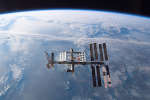 The International Space Station Expands Again
The International Space Station Expands Again
4.03.2008
The developing International Space Station (ISS) has changed its appearance again. Last month, the Space Shuttle orbiter Atlantis visited the ISS and added components that included the Columbus Science Laboratory. The entire array of expansive solar panels is visible in this picture taken by the Atlantis Crew after leaving the ISS to return to Earth.
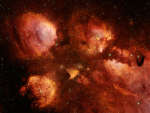 NGC 6334: The Cats Paw Nebula
NGC 6334: The Cats Paw Nebula
3.03.2008
Nebulae are perhaps as famous for being identified with familiar shapes as perhaps cats are for getting into trouble. Still, no known cat could have created the vast Cat's Paw Nebula visible in Scorpius.
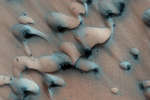 Sand Dunes Thawing on Mars
Sand Dunes Thawing on Mars
2.03.2008
What are these strange shapes on Mars? Defrosting sand dunes. As spring now dawns on the Northern Hemisphere of Mars, dunes of sand near the pole, as pictured above, are beginning to thaw. The carbon dioxide and water ice actually sublime in the thin atmosphere directly to gas.
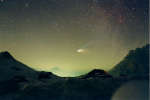 Comet Hale Bopp Over Val Parola Pass
Comet Hale Bopp Over Val Parola Pass
1.03.2008
Comet Hale-Bopp, the Great Comet of 1997, became much brighter than any surrounding stars. It was seen even over bright city lights. Away from city lights, however, it put on quite a spectacular show. Here Comet Hale-Bopp was photographed above Val Parola Pass in the Dolomite mountains surrounding Cortina d'Ampezzo, Italy.
 Mauna Kea Shadow Play
Mauna Kea Shadow Play
29.02.2008
Just opposite the setting Sun, the already-eclipsed Moon rose over the Hawaiian Islands on February 20. A view near the 14,000 foot peak of volcanic Mauna Kea on the Big Island, a popular spot for astronomers, offered this remarkable play of shadows and sunlight.
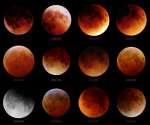 Twelve Lunar Eclipses
Twelve Lunar Eclipses
28.02.2008
Welcome to the extra day in the Gregorian Calendar's leap year 2008! To celebrate, consider this grid of lunar eclipse pictures - starting in leap year 1996 and ending with February's eclipse - with the date in numerical year/month/day format beneath each image.
 ISS: Sunlight to Shadow
ISS: Sunlight to Shadow
27.02.2008
Orbiting 400,000 kilometers above the Earth, the Moon slid into Earth's shadow to begin last week's total lunar eclipse. Of course the International Space Station (ISS) slides into Earth's shadow every 90 minutes, the time it takes it to complete one orbit at an altitude of about 400 kilometers.
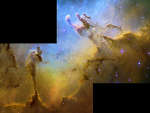 The Eagle Nebula in Hydrogen Oxygen, and Silicon
The Eagle Nebula in Hydrogen Oxygen, and Silicon
26.02.2008
Bright blue stars are still forming in the dark pillars of the Eagle Nebula. Made famous by a picture from the Hubble Space Telescope in 1995, the Eagle Nebula shows the dramatic process of star formation.
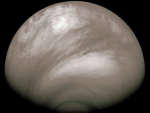 Mysterious Acid Haze on Venus
Mysterious Acid Haze on Venus
25.02.2008
Why did an acidic haze spread across Venus? The unusual clouds were discovered last July by ESA's robotic Venus Express spacecraft currently orbiting Venus. The bright and smooth haze was found by Venus...
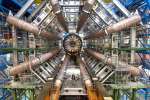 Dawn of the Large Hadron Collider
Dawn of the Large Hadron Collider
24.02.2008
Why do objects have mass? To help find out, Europe's CERN has built the Large Hadron Collider (LHC), the most powerful particle accelerator yet created by humans. This May, the LHC is scheduled to start smashing protons into each other with unprecedented impact speeds.
|
January February March April May June July August September October November December |
|||||||||||||||||||||||||||||||||||||||||||||||||